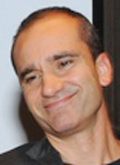Miguel M. Gonçalves, Ph.D.
School of Psychology
University of Minho
4710 Braga
Portugal
Email:mgoncalves@psi.uminho.pt
Miguel M. Gonçalves is Professor at School of Psychology, University of
Minho, Portugal. He is vice-president of the International Society of
Dialogical Self and associate editor of Psychotherapy Research. His main
research interests centers in the narrative and dialogical processes in
psychotherapy. He has developed the concept of innovative moment, as
events in psychotherapy in which novelties towards a previous
problematic pattern emerge. This concept has been inspiring his research
projects from the past few years.
Recent Publications:
- Alves, D., Mendes, I., Gonçalves, M. M., & Neymeier, R. (in press). Innovative Moments in Grief Therapy: Reconstructing Meaning following Perinatal Death. Death Studies.
- Bertau, M. C., Gonçalves, M. M., & Raggat, P. (Eds.) (in press, 2012). Dialogic Formations: Investigations into the Origins and Development of the Dialogical Self. Charlotte, NC: Information Age Publishing.
- Zitoun, T., Dankert, V., Valsiner, J.; Salgado, J., Gonçalves, M. M., & Ferring, D (in press, 2012). Melodies of living: Developmental science of human life course. Charlotte: Information Age Publishing. Charlotte: Information Age Publishing.
- Ribeiro, A., Gonçalves, M. M., & Santos, A. (in press, 2012). Innovative moments in psychotherapy: From the narrative outputs to the semiotic-dialogical processes. In S. Salvatore, J. Valsiner, S. Strout, & J. Clegg (Eds.), YIS: Yearbook of Idiographic Science – Volume 4. Charlotte: Information Age Publishing.
- Gonçalves, M. M. & Ribeiro, A. (2012). Narrative processes of innovation and stability within the dialogical self. In H. J. M. Hermans & T. Gieser (Eds.), Handbook of Dialogical Self Theory. Cambridge: Cambridge University Press.
- Cunha, C., Salgado, J., Gonçalves, M. M. (2011). The dialogical self in movement: Reflecting on methodological tools for the study of the dynamics of change and stability in the self. In E. Abbey & S. Surgan (Eds.), Emerging methods in psychology (Books series: History and theory in psychology, Editor: Jaan Valsiner). New Jersey: Transaction Publishers.
- Gonçalves, M. M., Cunha, C., Ribeiro, A., Salgado, J., Matos, M., Santos, A., & Mendes, I. (2011). Innovative moments in psychotherapy: Dialogical processes in developing narratives. In M. Märtsin, B. Wagoner, L. Whittaker, E-M Aveling, E I. Kadianaki (Eds.), Dialogicality in focus: Challenges to theory, method and application. New York: Nova Science Publishers.
- Cunha. C., Gonçalves, M. M., & Valsiner, J. (2011). Transforming self-narratives in psychotherapy: Looking at different forms of ambivalence in the change process. In R. Jones & M. Morioka (Eds.), Jungian and dialogical self perspectives. Hampshire: Palgrave Macmillan.
- Ribeiro, A. P. & Gonçalves, M. M. (2011). Maintenance and transformation of problematic self-narratives: A semiotic-dialogical approach. Integrative Psychological & Behavioral Science, 45, 281-303. DOI 10.1007/s12124-010-9149-0
- Gonçalves, M. M., Ribeiro, P. A., Mendes, I., Matos, M., & Santos, A. (2011). Tracking Novelties in Psychotherapy Process Research: The Innovative Moments Coding System. Psychotherapy Research, 21, 497-509. DOI: 10.1080/10503307.2011.560207.
- Mendes, I., Ribeiro, A. P., Angus, L., Greenberg, L., Gonçalves, M. M. (2011). Narrative change in emotion-focused psychotherapy: A study on the evolution of reflection and protest innovative moments. Psychotherapy Research, 21, 304-315. DOI: 10.1080/10503307.2011.565489.
- Gonçalves, M. M. & Stiles, W. B. (2011). Introducing the special section on Narrative and Psychotherapy. Psychotherapy Research, 21, 1-3.
- Gonçalves, M. M., Ribeiro, A. P., Conde, T., Matos, M, Santos, A., Martins, C., & Stiles, W. B. (2011). The Role of Mutual In-Feeding in Maintaining Problematic Self-Narratives: Exploring one Path to Therapeutic Failure. Psychotherapy Research, 21, 27-40.
- Ribeiro, A. P., Bento, T., Salgado, J., Stiles, B., & Gonçalves, M. M. (2011). A dynamic look at narrative change in psychotherapy: A case-study using the State-Space Grids. Psychotherapy Research, 21, 54-69.
- Gonçalves, M. M., Matos, M., Salgado, J., Santos, A., Mendes, I., Ribeiro, A., Cunha, C., & Gonçalves, J. (2010). Innovations in psychotherapy: Tracking the narrative construction of change. In J. D. Raskin, S. K. Bridges, & R. Neimeyer (Eds.), Studies in meaning 4: Constructivist Perspectives on Theory, Practice, and Social Justice (pp. 27-62) New York: Pace University Press.
- Mendes, I., Ribeiro, A. P. , Angus, L. E.,Greenberg, L. S., & Gonçalves, M. M. (2010). Narrative Change in Emotion-Focused Therapy: How is change constructed through the lens of the Innovative Moments Coding System? Psychotherapy Research, 20, 692-701.
- Gonçalves, M. M., Mendes, I., Ribeiro, A., Angus, L., & Greenberg, L. (2010). Innovative moments and change in emotion-focused therapy: The case of Lisa. Journal of Constructivist Psychology, 23, 267–294.
- Ribeiro, A., Bento, T., Gonçalves, M. M., & Salgado, J. (2010). Self-narrative reconstruction in psychotherapy: Looking at different levels of narrative development. Culture & Psychology, 16, 195-212.
- Ribeiro, A. & Gonçalves, M. M. (2010). Innovation and Stability within the Dialogical Self: The Centrality of Ambivalence. Culture & Psychology, 16, 116-126.
- Santos, A., Gonçalves, M. M., Matos, M., & Salvatore, S. (2009). Innovative moments and change pathways: A good outcome case of narrative therapy. Psychology and Psychotherapy: Theory, Research and Practice, 82, 449-466.
- Cunha, C. & Gonçalves, M. M. (2009). Accessing the experience of a dialogical self: Some needs and concerns. Culture & Psychology, 15, 120-133.
- Matos, M., Santos, A., Gonçalves, M. M., & Martins, C. (2009). Innovative moments and change in narrative therapy. Psychotherapy Research, 19, 68-80.
- Gonçalves, M. M., Matos, M., & Santos, A. (2009). Narrative therapies and the nature of “unique outcomes” in the construction of change. Journal of Constructivist Psychology, 22, 1-23.

